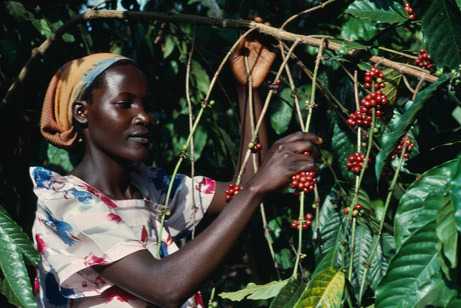Coffee in Uganda is traditionally thought of as a man’s crop—while women provide all of the labor up until the point of marketing, men get all of the proceeds.
In the rural areas in Uganda where coffee is grown, men, women, and youth share some common challenges in securing sustainable livelihoods.
These include poor infrastructure, lack of timely access to financial capital, few income opportunities and unpredictable weather and droughts.
Women, however, face additional challenges and constraints. For instance, women typically have an extraordinarily heavy workload, as they have to take care of the family and the household’s daily needs, in addition to typically contributing up to 70% of the labor in coffee production.
Understanding what gender encompasses for coffee growing households differs across stakeholders in coffee production.
To contribute to knowledge on the gender aspect of coffee production, the International Institute of Tropical Agriculture (IITA) and Mango Tree Educational Services (Mango Tree) have started a process of co-creation to re-think how gender can be approached in the coffee value chain.
In May 2018, a collaborative workshop took place with various experts working in gender and coffee. The experts brought their experience and knowledge from other sectors such as health, economy, and business.
During the workshop, researchers, ministry officials, NGOs, government and private sector partners discussed gender issues at the household level among smallholder coffee farmers in Uganda. They also explored new opportunities and concepts around gender relations in coffee farming communities and developed potential solutions to challenges faced at the household level.
The workshop used the Human-Centered Design approach, describing typical personas within coffee farming communities to explore what gender issues they face. With this approach, the workshop aimed to help participants better understand people’s lives and how gender plays a role in their livelihoods.
Workshop participants created four hypothetical personas that could portray typical individuals from coffee farming households in coffee-growing communities in Uganda. Each persona was further described using a set of typical characteristics of such persons based on the participants’ experience.
The four personas and their characteristics:
1. Older male coffee farmer. He has 2 wives (50 and 35 years old respectively). One of his biggest challenges is the lack of resources to adequately take care of his large family.
2. Older female coffee farmer. She has a large work burden which includes the care of children, maintaining the household, washing clothes, and preparing food for the family. She also maintains and harvests coffee and other food crops. She is overwhelmed both mentally and physically.
3. Young male coffee farmer. His biggest problem is the lack of access to factors of production such as land. He has a family that he struggles to care for effectively.
4. Young female coffee farmer. Just like her male counterpart, she has negative attitudes towards agriculture.
Subsequent discussions focused on the gender-related constraints and possible solutions for each persona. Each group presented their detailed description of the persona they were working on to the rest of the workshop members and a two-way feedback session was allowed for each presenting group
Participants agreed that gender-transformative approaches ought to be gender-inclusive to address various push and pull factors of gender inequality within a household. Joint household planning, for example, could lead to improved childcare and education, family nutrition and health. This could help to mitigate some of the gender-related issues identified such as child neglect or abuse, lack of schooling, poor family health, and contraction and ill-treatment of diseases such as HIV, among others.
The workshop ended with concrete recommendations from the expert participants on how IITA and Mango Tree could develop gender-transformative approaches that focus on each category of coffee farmers based on the personas created.
This workshop was the first of a series of activities that will be conducted in a quest to develop gender-transformative approaches for coffee farming households.
Next steps
The next step will be to engage with the coffee farmers from different communities in Uganda to gain insight into their perceptions of gender, explore their needs, and generate specific solutions together. This will then be consolidated with the findings from the expert workshop.
A final workshop will take place with some farmer representatives that were part of the farmer engagement and the same gender experts that attended the first workshop. During this workshop, the participants will brainstorm and draft a toolkit of gender-transformative approaches from the previous engagements.
The approaches that emerge as the most appropriate ones for the different groups will at a later stage be tested at the household level. Finally, those approaches that will produce positive gender outcomes will be communicated to partners in both the public and private sector to utilize in their outreach to coffee farmers
















